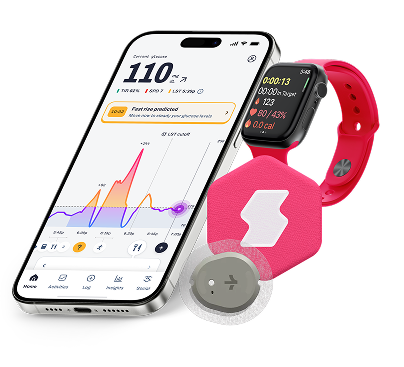Pomegranates, revered for their exquisite taste and vibrant ruby-red seeds, are a culinary delight and an exceptional addition to a healthy diet. Contrary to common misconceptions, the glycemic index of pomegranates is surprisingly low, making them a favorable choice for individuals concerned about managing their blood sugar levels.
Rich in antioxidants and phytochemicals, pomegranates have been associated with various health benefits, including improved cardiovascular health and reduced inflammation. Pomegranates also boast substantial levels of vitamins C and K and a noteworthy fiber content that contributes to their potential positive impact on blood sugar regulation.
This article will explore the lesser-known aspects of the pomegranate's glycemic index and the comprehensive health advantages of incorporating this remarkable fruit into your daily dietary regimen.
Sign up to be the first to know about special offers and exciting Signos news.
Glycemic Index Table
A serving size of 100g of pomegranate contains approximately 18.7g of carbohydrates.¹ It is generally recognized that pomegranates have a low glycemic index, typically below 55. Consequently, their impact on blood sugar levels is relatively minimal compared to many other fruits, making them a suitable option for individuals with diabetes or those aiming to regulate their blood sugar.
Cooking or processing pomegranates is unlikely to significantly affect their glycemic index, as their sugars are mostly bound within the arils, the juice-filled seed casings, which remain relatively stable during cooking or processing. Thus, pomegranates can be a valuable addition to a balanced diet, contributing to a moderate glycemic load (GL) per serving and enhancing the overall nutritional profile without causing significant blood sugar spikes.

Nutritional Facts
Pomegranates are a nutritional powerhouse known for their rich content of vitamins, minerals, and antioxidants. A 100g serving of pomegranate seeds provides approximately 83 calories, 18.7g of carbohydrates, 1.7g of fiber, and 1.7g of protein. They are also a great source of vitamin C, offering 10.2mg per 100g, which accounts for about 17% of the recommended daily intake.² Additionally, pomegranates contain vitamin K, folate, and essential minerals.
The nutritional information below is for 100 g of pomegranate.²
Nutritional Facts

Is Pomegranate Good for Weight Loss?
Pomegranates can be a valuable component of a weight loss regimen due to their low-calorie content, high fiber, and substantial water composition, contributing to increased satiety and reduced overall calorie intake. Moreover, the polyphenols found in pomegranates have been associated with improved metabolic health, potentially aiding in fat metabolism regulation and fat accumulation reduction. While direct evidence supporting pomegranates as a weight loss superfood is limited, their inclusion as part of a balanced diet can offer a nutritious and satisfying option for those aiming to manage their weight.
It's important to note that weight loss is a complex process, and incorporating pomegranates into a holistic approach that includes a well-rounded diet and regular physical activity is key. Consulting with a healthcare provider or a registered dietitian can help create a personalized diet plan tailored to specific weight loss goals.
Is Pomegranate Safe for People Living with Diabetes?
Pomegranates can be a beneficial addition to the diets of individuals with diabetes due to their low glycemic index and potential positive effects on blood sugar control. Research suggests that the bioactive compounds in pomegranates, such as ellagitannins and anthocyanins, may improve insulin sensitivity and reduce inflammation, crucial factors in managing diabetes. Additionally, the significant fiber content in pomegranates can aid in regulating blood sugar levels and promoting better glycemic control.
As with any dietary changes, consulting a healthcare provider or a registered dietitian is recommended to tailor the diet according to individual health needs and preferences.
Better health starts here.
Sign up for tips and insights that work for you!
Allergies
While pomegranates are generally considered safe for consumption, some individuals may experience allergic reactions to pomegranate components, primarily due to certain compounds like tannins and anthocyanins.
Symptoms of pomegranate allergy can range from mild oral allergy syndrome, including itching or swelling of the lips, mouth, and throat, to more severe reactions such as hives, itching, or even anaphylaxis in rare cases.
For specific guidance, it is recommended to consult with a healthcare professional or an allergist for proper evaluation and management.

References
References
- The University of Sydney. (2023, May 1). Glycemic Index – Glycemic Index Research and GI News. https://glycemicindex.com/
- USDA FoodData Central. (2019, April 1). Food Details - Pomegranates, raw. https://fdc.nal.usda.gov/fdc-app.html#/food-details/169134/nutrients




.svg)
.svg)
.svg)
.svg)
.svg)
.svg)
.svg)
.svg)
